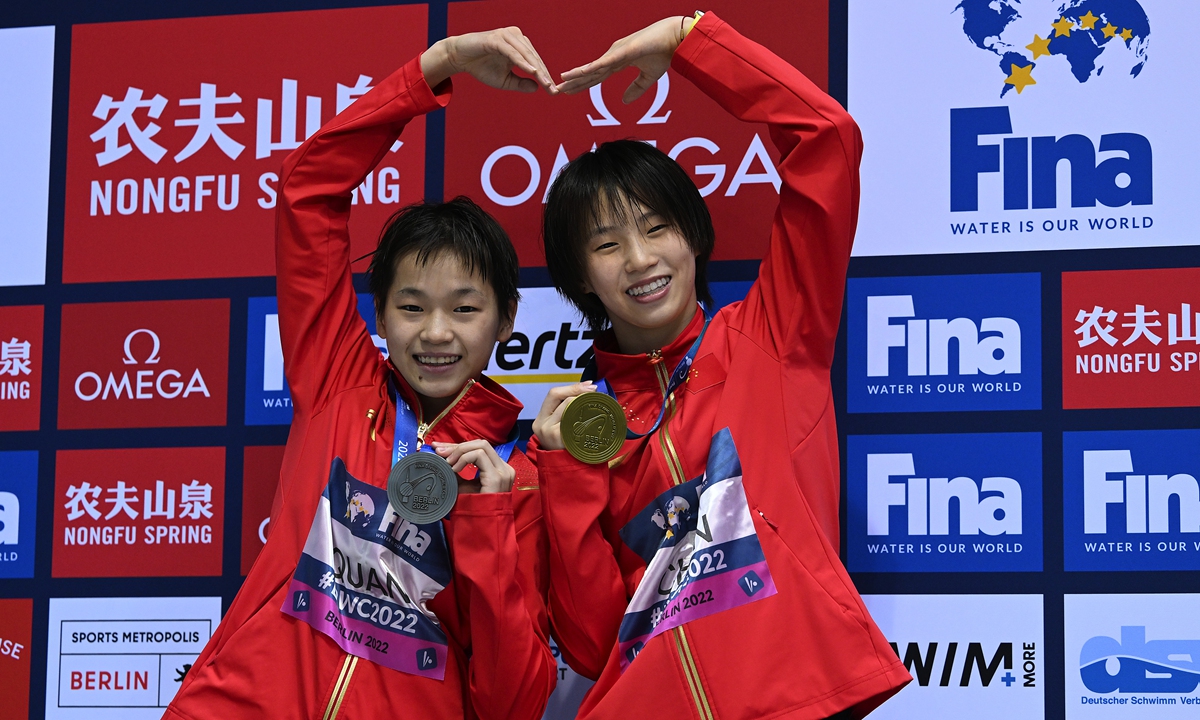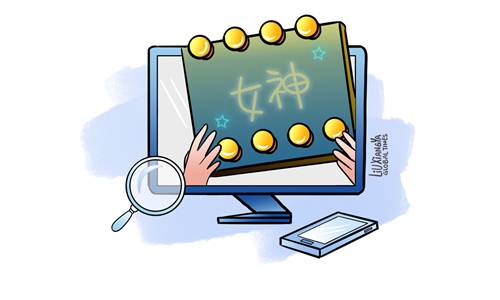
Gold medalist Chen Yuxi (right) and silver medalist Quan Hongchan reacts on the podium after the women's 10-meter platform during Day 2 of the FINA Diving World Cup Berlin in Berlin, Germany on October 22, 2022. Photo: VCG
The 2023 National Diving Championships last week were drawn into controversy after a fan accused the referees of being biased against Olympic champion Quan Hongchan in the final of the 10-meter platform diving event.
The incident later triggered wider discussion on the impact of fandom culture in the sports field.
On Wednesday, Chen Yuxi, China's three-time world champion, clinched the gold medal with 436.80 points, edging out Quan Hongchan, who scored 427.60 points and settled for silver.
During the post-match interview, a fan's voice was heard from the stands, alleging that "the referees were unfair and deliberately suppressed Quan's score."
A video of the scene went viral online, sparking mixed reactions from netizens. Some supported the fan's claim, while others criticized the fan's behavior as disrespectful and irrational.
The debate was fueled by He Chong, a Chinese diving star and Quan's fellow Zhanjiang native, who posted a long article on Weibo on Saturday, slamming the fan circle's interference with the diving competition and refuting the "suppression" fallacy.
He argued that the fan circle, which refers to a group of enthusiasts who are overly obsessed with their idols, has become a force that cannot be ignored. He said that the phenomenon that originated from the entertainment industry has now infiltrated into the sports industry, which is very alarming.
"The fan culture may have a negative impact on the athletes, as it fosters emotionalization and personal worship. Many young fans put their favorite stars or athletes in a nearly perfect position, and when these idols fail to achieve the expected results, these fans often look for external factors to defend their idols," He said.
He added that these fans lack a comprehensive understanding of the rules and criteria of the sports, and their remarks can be "misleading to others who do not have a panoramic view of the incident."
On Monday, the General Administration of Sports of China and the Chinese Olympic Committee reposted an article from China Sports Daily, noting that such behavior should be "firmly rejected" to create a fair and equitable environment for the sports industry. This is necessary, so that "the athletes can entirely focus on their events and be a true role model for their fans."
The Chinese government has been seeking ways to deal with unhealthy fandom culture since 2021, and measures have been taken to crack down on frenzied idol worship among underage fans.
However, as the fan economy continues to heat up, the trend of fan adoration is rapidly spreading to athletes.
There have been several incidents of frenzied fans intruding into athletes' personal lives, which have raised concerns on Chinese social media.
For example, in mid-October this year, a trending video showed Chinese table tennis star Wang Chuqin being closely followed by someone filming him at the airport. Wang took to social media to voice his concerns about the excessive behavior of fans, calling for them to resist paparazzi-like behavior and respect the privacy of athletes.
Another similar situation happened to Yang Shuyu, a Chinese basketball star who also expressed her sense of dismay and anger over the invasion of her personal life in mid-October. She posted on Weibo that she did not want her personal information and itinerary to be obtained through illegal means.
The Chinese Olympic Committee issued a statement in September 2021, highlighting the need to rein in fan culture in the sports community and requesting that Chinese athletes refrain from initiating or taking part in relevant conversations or fan groups.
The topic of fan culture has also received attention from the Chinese media, with reports encouraging supporters to respect sportsmen and follow them in a logical manner.
"The base logic of the fandom culture is no culture at all. These so-called fans, for the most part, do not understand or appreciate the careers or talents of famous athletes. Instead, they only focus on the athletes' image and appearance," Wang Dazhao, a Beijing-based sports commentator, told the Global Times.
"Those who violate other people's privacy must be punished in accordance with the law, and those who do not violate criminal laws must be warned and guided through active and healthy education," Wang added.

